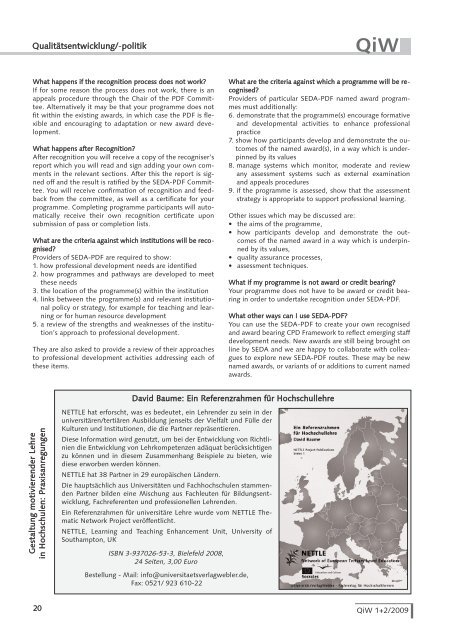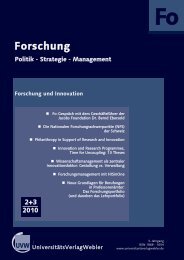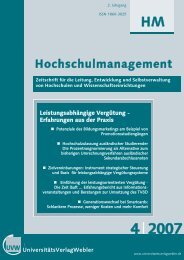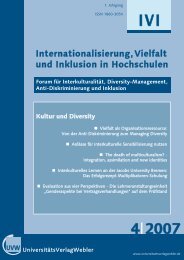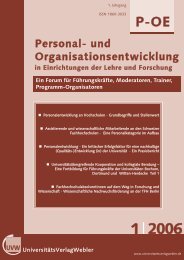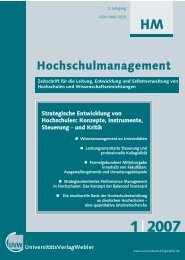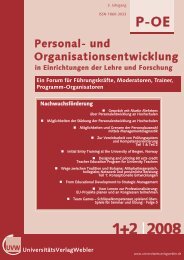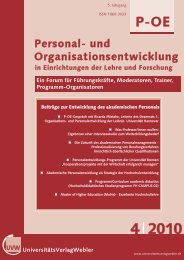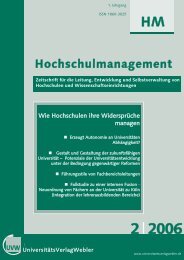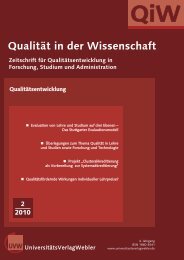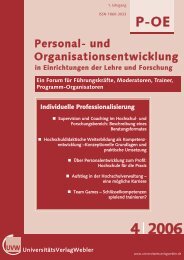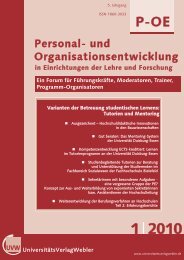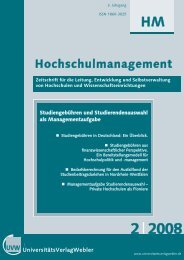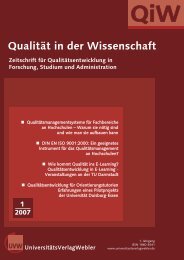QiW - UniversitätsVerlagWebler
QiW - UniversitätsVerlagWebler
QiW - UniversitätsVerlagWebler
Sie wollen auch ein ePaper? Erhöhen Sie die Reichweite Ihrer Titel.
YUMPU macht aus Druck-PDFs automatisch weboptimierte ePaper, die Google liebt.
Qualitätsentwicklung/-politik<br />
<strong>QiW</strong><br />
What happens if the recognition process does not work?<br />
If for some reason the process does not work, there is an<br />
appeals procedure through the Chair of the PDF Committee.<br />
Alternatively it may be that your programme does not<br />
fit within the existing awards, in which case the PDF is flexible<br />
and encouraging to adaptation or new award development.<br />
What happens after Recognition?<br />
After recognition you will receive a copy of the recogniser’s<br />
report which you will read and sign adding your own comments<br />
in the relevant sections. After this the report is signed<br />
off and the result is ratified by the SEDA-PDF Committee.<br />
You will receive confirmation of recognition and feedback<br />
from the committee, as well as a certificate for your<br />
programme. Completing programme participants will automatically<br />
receive their own recognition certificate upon<br />
submission of pass or completion lists.<br />
What are the criteria against which institutions will be recognised?<br />
Providers of SEDA-PDF are required to show:<br />
1. how professional development needs are identified<br />
2. how programmes and pathways are developed to meet<br />
these needs<br />
3. the location of the programme(s) within the institution<br />
4. links between the programme(s) and relevant institutional<br />
policy or strategy, for example for teaching and learning<br />
or for human resource development<br />
5. a review of the strengths and weaknesses of the institution’s<br />
approach to professional development.<br />
They are also asked to provide a review of their approaches<br />
to professional development activities addressing each of<br />
these items.<br />
What are the criteria against which a programme will be recognised?<br />
Providers of particular SEDA-PDF named award programmes<br />
must additionally:<br />
6. demonstrate that the programme(s) encourage formative<br />
and developmental activities to enhance professional<br />
practice<br />
7. show how participants develop and demonstrate the outcomes<br />
of the named award(s), in a way which is underpinned<br />
by its values<br />
8. manage systems which monitor, moderate and review<br />
any assessment systems such as external examination<br />
and appeals procedures<br />
9. if the programme is assessed, show that the assessment<br />
strategy is appropriate to support professional learning.<br />
Other issues which may be discussed are:<br />
• the aims of the programme,<br />
• how participants develop and demonstrate the outcomes<br />
of the named award in a way which is underpinned<br />
by its values,<br />
• quality assurance processes,<br />
• assessment techniques.<br />
What if my programme is not award or credit bearing?<br />
Your programme does not have to be award or credit bearing<br />
in order to undertake recognition under SEDA-PDF.<br />
What other ways can I use SEDA-PDF?<br />
You can use the SEDA-PDF to create your own recognised<br />
and award bearing CPD Framework to reflect emerging staff<br />
development needs. New awards are still being brought on<br />
line by SEDA and we are happy to collaborate with colleagues<br />
to explore new SEDA-PDF routes. These may be new<br />
named awards, or variants of or additions to current named<br />
awards.<br />
David Baume: Ein Referenzrahmen für Hochschullehre<br />
Gestaltung motivierender Lehre<br />
in Hochschulen: Praxisanregungen<br />
NETTLE hat erforscht, was es bedeutet, ein Lehrender zu sein in der<br />
universitären/tertiären Ausbildung jenseits der Vielfalt und Fülle der<br />
Kulturen und Institutionen, die die Partner repräsentieren.<br />
Diese Information wird genutzt, um bei der Entwicklung von Richtlinien<br />
die Entwicklung von Lehrkompetenzen adäquat berücksichtigen<br />
zu können und in diesem Zusammenhang Beispiele zu bieten, wie<br />
diese erworben werden können.<br />
NETTLE hat 38 Partner in 29 europäischen Ländern.<br />
Die hauptsächlich aus Universitäten und Fachhochschulen stammenden<br />
Partner bilden eine Mischung aus Fachleuten für Bildungsentwicklung,<br />
Fachreferenten und professionellen Lehrenden.<br />
Ein Referenzrahmen für universitäre Lehre wurde vom NETTLE Thematic<br />
Network Project veröffentlicht.<br />
NETTLE, Learning and Teaching Enhancement Unit, University of<br />
Southampton, UK<br />
ISBN 3-937026-53-3, Bielefeld 2008,<br />
24 Seiten, 3,00 Euro<br />
Bestellung - Mail: info@universitaetsverlagwebler.de,<br />
Fax: 0521/ 923 610-22<br />
20<br />
<strong>QiW</strong> 1+2/2009


